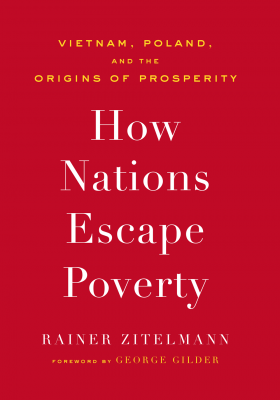Foreword by George Gilder
The Dazzling Dozen: Rainer’s Rules of Wealth and Poverty
Rainer Zitelmann is a supreme entrepreneurial historian and philosopher, ingenious pollster, and practitioner of the arts and enigmas of the wealth and poverty of nations. A remorseless seeker of facts rather than self-serving myths, he scrupulously documents his shocking revelations with detailed and authorita- tive data.
His iconoclastic views can be summed up in twelve key epiphanies.
- Key to economic growth and enterprise is admiration and emulation of the rich. Key to poverty and sloth is demoralization of the poor by telling them they are vic- tims of the rich.
- Poverty stems from envy and resentment toward wealth as a zero-sum game. Wealth stems from the desire and freedom to become rich in ever-expanding circles of gain. Vietnamese and Polish citizens now harbor more favorable attitudes toward the rich than do Americans or Germans. Thus, the Vietnamese and Polish economies have grown far faster than apparently privileged West- ern rivals. An explanation: Zitelmann’s polls show that staunch Marxist views are far more common in so-called “capitalist” US or Europe than in so-called “communist” parts of Asia, such as Vietnam.
- Fifty years and trillions of dollars of development aid and 100 years of socialist giveaways prove that the prime cause of poverty among nations is government redistribution of wealth. The chief source of new wealth and growth is entrepreneurial disruption of incumbent wealth.
- Around the globe, the more “aid” the less growth. Scru- tiny of hundreds of studies shows that economic growth and escape from poverty are inversely proportional to the amount of development aid received. Foreign aid goes to governments and trickles down only to bureaucrats and “crony capitalists,” not to the people.
- Inequality always rises as people escape poverty. Suppress inequality and growth stalls.
- Enterprise, unlike socialism, cannot be decreed from the top down; it must be freed from the bottom up.
- Rapid reformers experience shorter recessions and quicker recoveries and attract far more foreign investment than do gradualist reformers.
- Support for capitalism in polls rises in proportion to the avoidance of using the term. Westerners should stress dynamism and freedom rather than “capitalist” wealth.
- The fatal flaw of current democracies is giving incumbent governments and their central banks the power to print money to finance their friends and frivols, buy off voters with redistribution schemes, and disguise failure with flamboyant demagoguery and giveaways. In a portentous lesson for the West, Argentina and Venezuela were both among the richest countries in the world, but they gave it all up pursuing demagogic class warfare and socialism under Juan Perón and Hugo Chávez.
- Zitelmann’s bikini law of accounting transparency and truth eclipsing concealment and complexity: less is more. Example: Nguyen Thi Phuong-Thao (the one woman among seven Vietnamese billionaires) went from selling fax machines as a student in Moscow in 1981 to launching a low-cost airline, VietJet Air. Saving money on uniforms and delighting customers, she encouraged her steward- esses to wear bikinis, which, she points out boldly, “shows beautiful characteristics” and “makes people happy.” The same applies to accounting.
- Zitelmann’s Law of Corruption: more is more. The more influence a government has over a country, the more pervasive is corruption; the more interventions by bureau- crats, the more chances to bribe them.
- Zitelmann’s final Polish joke: Poland beating out the rest of Europe and America in economic growth since the 1989 emancipation of Polish enterprise, with more than one million new private firms launched in four years and per capita GDP up 2.5 times by 2017.
The information theory behind the huge growth of the global information economy (and my Life After Capitalism) identifies wealth as knowledge, growth as learning, money as tokenized time, and new knowledge as “surprisal.” In information theory, information is “unexpected bits.” Imparting surprises on every page, even for sophisticated theorists of capitalism, Zitelmann’s book makes a major new contribution to the wealth of nations.
George Gilder, author of Wealth & Poverty (1980) and Life After Capitalism (2023)
February 2024
